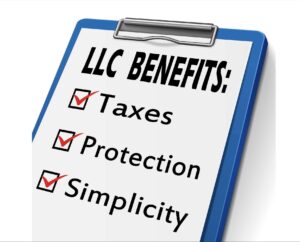Starting a business involves many decisions, one of the most crucial being the choice of business structure. This decision affects everything from daily operations, taxes, and the amount of personal liability you face. As a business owner, you have several options, each with its pros and cons. Let’s discuss some of these options.
Sole Proprietorship
A sole proprietorship is the simplest and most common business structure. It’s an unincorporated business owned and run by one individual, with no distinction between the business and the owner. This means that as a sole proprietor, you’re entitled to all profits but are also responsible for all the business’s debts, losses, and liabilities.
Partnerships
A partnership involves two or more people who agree to share in the profits or losses of a business. There are different types of partnerships, such as general partnerships, limited partnerships, and limited liability partnerships.
Limited Liability Company (LLC)
An LLC combines the benefits of both partnerships and corporations. It offers flexibility and protects owners (called members) from personal liability for business debts and claims, similar to a corporation while allowing profits and losses to be passed through to the members’ income without facing corporate taxes.
LLCs in the USA
In the USA, LLCs are a popular choice for many entrepreneurs and small business owners due to their simplicity, flexibility, and protection. Each state has its regulations and requirements for forming and operating an LLC, but the general process is relatively straightforward. The LLC structure is particularly appealing in the USA because it accommodates a wide range of business types and sizes, from solo entrepreneurs to large enterprises. It allows business owners to take advantage of favorable tax treatment while also providing a safeguard for their assets.

8 Benefits of LLC is the USA
Limited Liability Protection
One of the most significant benefits of forming a Limited Liability Company (LLC) is the limited liability protection it offers to its members. This protection means that the personal assets of LLC members—such as their homes, cars, and personal bank accounts—are generally shielded from the company’s debts and legal obligations. In the unfortunate event that the LLC faces a lawsuit or incurs significant debt, the financial responsibility is limited to the assets owned by the business. This reduces the personal risk for members, providing them with peace of mind and financial security.
For instance, if an LLC is sued for damages resulting from a business activity, only the assets owned by the LLC are at risk. The personal assets of the members remain protected, unlike in a sole proprietorship or general partnership, where personal assets can be seized to cover business liabilities. This is particularly beneficial for small business owners who may not have extensive resources and for whom personal financial stability is crucial.
Moreover, this protection can enhance the LLC’s ability to attract investment. Potential investors may feel more comfortable investing in a business where their risk is minimized. This limited liability feature not only safeguards members but also encourages entrepreneurial ventures by mitigating the fear of personal financial ruin due to business failures.
Tax Flexibility
Another compelling benefit of forming an LLC is the tax flexibility it offers. LLCs are unique in that they can choose how they want to be taxed, which can lead to significant tax savings and efficiencies. By default, single-member LLCs are treated as sole proprietorships and multi-member LLCs are treated as partnerships for tax purposes. This means that the LLC itself does not pay federal income taxes. Instead, the profits and losses “pass through” to the members, who report them on their tax returns. This avoids the double taxation issue that corporations often face, where the company pays taxes on its profits, and the shareholders also pay taxes on dividends.
It’s Important to Remember
LLCs are not limited to this default tax treatment. They can also elect to be taxed as a C corporation or an S corporation by filing the appropriate forms with the IRS. Each of these tax statuses has its advantages and exceptions.
S Corporation Election
Electing to be taxed as an S corporation can allow LLC members to save on self-employment taxes. In an S corporation, members can designate a portion of their income as salary (subject to payroll taxes) and the remainder as distributions (which are not subject to self-employment taxes). This can result in substantial tax savings for LLC members, as they only pay payroll taxes on their salary portion and not on the entire income.
C Corporation Election
Electing C corporation status might be beneficial for LLCs that plan to reinvest profits back into the business rather than distribute them to members. C corporations can retain earnings at the corporate tax rate, which might be lower than individual tax rates. This can be advantageous for LLCs looking to grow and expand their operations without the immediate need to distribute profits.
The bottom line is LLCs are flexible when it comes to adopting a tax strategy. This is why many business owners prefer LLCs over sole proprietorships or partnerships in the US.
Management Flexibility
LLCs offer remarkable management flexibility, allowing businesses to choose the structure that works best for them. Unlike corporations with a rigid hierarchy, LLCs can be managed by members or appointed managers. In a member-managed LLC, all members participate in running the business, which is ideal for smaller companies where collaboration is key. On the other hand, a manager-managed LLC lets members appoint managers to handle day-to-day operations, freeing them to focus on strategic decisions. This adaptability ensures that the management structure aligns with the business’s needs, making LLCs an attractive option for diverse business types.
Flexible Membership
LLCs provide unparalleled flexibility in membership, accommodating an unlimited number of members, including individuals, corporations, other LLCs, and foreign entities. This inclusivity allows for a diverse ownership structure, attracting a wide range of investors and partners. Unlike S corporations, which cap shareholders at 100, LLCs can scale without membership restrictions. This flexibility not only facilitates growth and investment but also simplifies the transfer of ownership, making it easier to bring in new members or adjust ownership stakes as the business evolves.
Fewer Formalities
Operating an LLC comes with the advantage of fewer formalities, easing the administrative burden. Unlike corporations, LLCs are not required to hold annual meetings or maintain extensive records. This reduction in bureaucratic procedures allows business owners to concentrate on growing their business rather than dealing with compliance paperwork. The streamlined operations mean lower costs and less time spent on regulatory requirements, making LLCs an efficient and appealing choice for many entrepreneurs who want to focus on their business’s core activities.
Credibility
Adding “LLC” to your business name can significantly enhance its credibility and professionalism. This designation signals to customers, partners, and investors that the business is a legitimate and well-structured entity. The formal structure of an LLC can instill confidence in potential clients and business associates, as it indicates that the business owners are serious about their enterprise and committed to adhering to certain legal and financial standards. This professional image can be particularly beneficial when negotiating contracts, securing financing, or establishing partnerships. By projecting stability and reliability, an LLC can attract more business opportunities and foster trust in the marketplace, giving it a competitive edge.
Ease of Formation
Forming an LLC is generally a straightforward and cost-effective process, making it an attractive option for many entrepreneurs. The steps typically involve choosing a business name, filing Articles of Organization with the state, and paying a filing fee. Compared to forming a corporation, the requirements are less complex and less expensive. Additionally, LLCs face fewer ongoing compliance requirements, such as mandatory annual meetings and extensive record-keeping, which simplifies management and reduces administrative costs. This ease of formation and maintenance allows business owners to focus more on their core operations and less on bureaucratic hurdles, making it an ideal choice for startups and small businesses looking to establish themselves quickly and efficiently.
Perpetual Existence
An LLC offers the advantage of perpetual existence, meaning the business can continue to operate beyond the departure or death of its members. Unlike sole proprietorships, which cease to exist when the owner leaves or passes away, an LLC remains intact, providing stability and continuity. This perpetual existence ensures that the business can carry on its operations without interruption, preserving its value and relationships with customers, suppliers, and employees. It also makes it easier to transfer ownership or bring in new members, facilitating smoother succession planning and enhancing the long-term viability of the business. This continuity can be a crucial factor for businesses seeking to build lasting legacies and sustain growth over time.
Final Thoughts
In conclusion, forming an LLC in the USA can be a game-changer for your business. With its combination of flexibility, protection, and credibility, an LLC helps create a strong foundation for growth and success. Whether you’re just starting or looking to expand, an LLC provides the structure and support your business needs to thrive in today’s competitive market. Embrace the advantages of an LLC and take your business to the next level.




